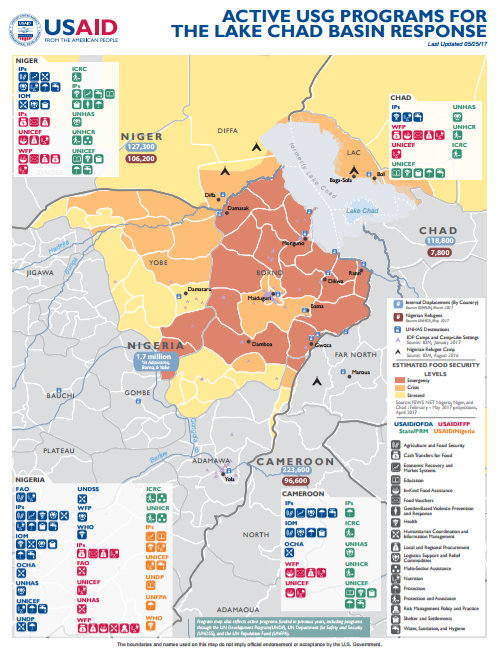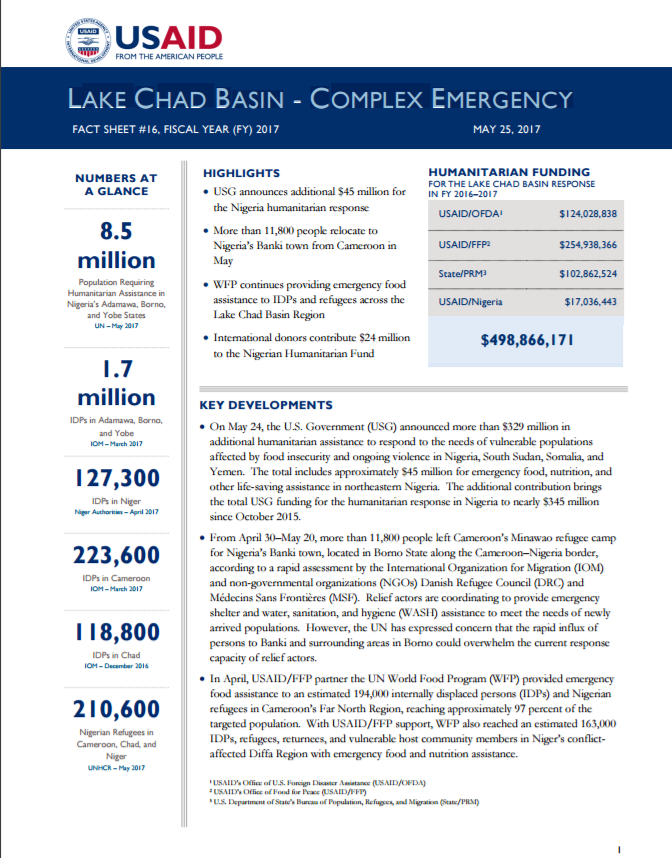- What We Do
- Agriculture and Food Security
- Democracy, Human Rights and Governance
- Economic Growth and Trade
- Education
- Ending Extreme Poverty
- Environment and Global Climate Change
- Gender Equality and Women's Empowerment
- Global Health
- Water and Sanitation
- Working in Crises and Conflict
- Disaster Assistance
- Political Transition Initiatives
- Conflict Mitigation and Prevention
- Countering Violent Extremism
- Disaster Risk Reduction
- Peacebuilding and Reconciliation
- Providing Safe & Secure Environments for Development
- Recovering From Crisis
- Resilience
- Tech Challenge for Atrocity Prevention
- World Humanitarian Day
- U.S. Global Development Lab
May 25, 2017
Highlights
- USG announces additional $45 million for the Nigeria humanitarian response
- More than 11,800 people relocate to Nigeria’s Banki town from Cameroon in May
- WFP continues providing emergency food assistance to IDPs and refugees across the Lake Chad Basin Region
- International donors contribute $24 million to the Nigerian Humanitarian Fund
Lake Chad Basin Complex Emergency Map #16 FY2017 ![]() (pdf - 513k)
(pdf - 513k)
Numbers At A Glance
8.5 million
1.7 million
127,300
223,600
118,800
210,600
Humanitarian Funding
For the Lake Chad Basin Response
| USAID/OFDA | $124,028,838 |
| USAID/FFP | $254,938,366 |
| State/PRM | $102,862,524 |
| USAID Nigeria | $17,036,443 |
| Total | $498,866,171 |
KEY DEVELOPMENTS
On May 24, the U.S. Government (USG) announced more than $329 million in additional humanitarian assistance to respond to the needs of vulnerable populations affected by food insecurity and ongoing violence in Nigeria, South Sudan, Somalia, and Yemen. The total includes approximately $45 million for emergency food, nutrition, and other life-saving assistance in northeastern Nigeria. The additional contribution brings the total USG funding for the humanitarian response in Nigeria to nearly $345 million since October 2015.
From April 30–May 20, more than 11,800 people left Cameroon’s Minawao refugee camp for Nigeria’s Banki town, located in Borno State along the Cameroon–Nigeria border, according to a rapid assessment by the International Organization for Migration (IOM) and non-governmental organizations (NGOs) Danish Refugee Council (DRC) and Médecins Sans Frontières (MSF). Relief actors are coordinating to provide emergency shelter and water, sanitation, and hygiene (WASH) assistance to meet the needs of newly arrived populations. However, the UN has expressed concern that the rapid influx of persons to Banki and surrounding areas in Borno could overwhelm the current response capacity of relief actors.
In April, USAID/FFP partner the UN World Food Program (WFP) provided emergency food assistance to an estimated 194,000 internally displaced persons (IDPs) and Nigerian refugees in Cameroon’s Far North Region, reaching approximately 97 percent of the targeted population. With USAID/FFP support, WFP also reached an estimated 163,000 IDPs, refugees, returnees, and vulnerable host community members in Niger’s conflict-affected Diffa Region with emergency food and nutrition assistance.
REGIONAL
More than 11,800 people relocated from Cameroon’s Minawao refugee camp to Nigeria’s Banki town, Bama Local Government Area (LGA), between April 30 and May 20, according to a recent rapid assessment conducted by DRC, IOM, and MSF. In addition, humanitarian organizations report that nearly 1,350 people relocated from Banki to Borno’s Pulka town, Gwoza LGA, on May 22, with additional people reportedly awaiting transport from Banki to other locations, according to the UN. Humanitarian actors are engaging with Cameroonian and Nigerian authorities to develop plans to inform response activities in return areas.
Humanitarian agencies note that the recent population influx to Banki could overwhelm the existing capacity of relief actors to respond, highlighting that the IDP population in the town has increased by 38 percent since April 30. Despite limited resources, relief organizations are coordinating to respond to the needs of returning populations. IOM is prioritizing the establishment of 500 tents in Gwoza and Pulka towns, with plans to distribute emergency shelter materials, including rope and plastic sheeting, to provide temporary support for returnees, the UN reports. In Gwoza, relief actors are also establishing additional latrines and water points and providing emergency health care services for returnee populations.
In addition to addressing increased needs in Banki, humanitarian agencies are also providing services to IDPs and returnees elsewhere in Borno, including in Bama, Dikwa, Gwoza, and Kala-Balge LGAs, where returning populations and conflict-related displacement are straining available resources.
NIGERIA
USAID/FFP recently announced $34 million in funding to support emergency food assistance for vulnerable populations in Adamawa, Borno, and Yobe states. The contribution includes approximately $9 million to the UN Children’s Fund (UNICEF) to provide ready-to-use therapeutic food to more than 126,000 children younger than five years of age experiencing severe acute malnutrition, as well as to strengthen coordination and monitoring activities among nutrition actors. The contribution also includes more than $25 million to implementing partners to expand nutrition interventions and cash-based food assistance to benefit acutely food-insecure populations in Borno and Yobe.
From May 1–15, USAID/FFP partner WFP provided emergency food assistance to an estimated 546,000 people in northeastern Nigeria, including in northern areas of Adamawa State where the UN agency is working to rapidly increase food assistance for acutely food-insecure populations. Starting in June, WFP plans to prioritize assistance for more than 1.3 million people in northeastern Nigeria through the lean season, and is coordinating with other food security actors to minimize assistance gaps and ensure coverage for the most acutely food-insecure people. To date in FY 2017, USAID/FFP has provided more than $59 million to support WFP operations in northeastern Nigeria.
USAID/FFP NGO partners operating in Borno and Yobe provided emergency food assistance and nutrition interventions for more than 381,000 people in April—a 35 percent increase since March.
From May 5–11, a USAID/OFDA partner reached nearly 58,700 conflict-affected individuals in Adamawa and Borno with WASH services and supplies, including providing nearly 8,100 IDPs and host community members with safe drinking water in Gwoza and nearly 1,700 IDPs in Adamawa with hygiene supplies. With USAID/OFDA support, the organization is also helping conflict-affected communities in Adamawa and Borno prepare for the rainy season, when prevalence of malaria and waterborne illnesses typically increases. The partner is distributing mosquito nets and acute watery diarrhea and cholera prevention kits, which contain water purification tablets, soap, and oral rehydration salts.
In April, a USAID/OFDA partner provided health consultations to nearly 2,500 conflict-affected people in Borno’s Jere and Monguno LGAs, conducted acute malnutrition screenings for more than 9,700 children younger than five years of age in Maiduguri Metropolitan Council (MMC), and distributed soap and other sanitation supplies to health facilities in MMC and Borno’s Ngala LGA. In Yobe, the organization distributed tools for solid waste management—including incinerators, gloves, shovels, and wheelbarrows—and trained members of conflict-affected communities on the proper disposal of solid waste. The NGO also reached more than 1,100 children and adults in six communities of Yobe’s Gujba LGA with environmental and personal hygiene promotion activities.
With USAID/OFDA support, IOM is providing emergency mental health and psychosocial support activities for conflict-affected populations in northeastern Nigeria. In addition to providing emergency psychosocial support services in Borno, the partner is repairing the psychiatric ward of a hospital in Adamawa’s Yola city, training local health care workers to use psychological assessment tools, and building the capacity of Government of Nigeria (GoN) Ministry of Health staff to scale up mental health care activities, among other interventions.
CAMEROON
Following advocacy efforts by the Office of the UN High Commissioner for Refugees (UNHCR), local authorities in Far North Region recently authorized the establishment of three transit centers for refugees in Logone-et-Chari, Mayo Sava, and Mayo Tsanaga departments. Under the Tripartite Agreement—signed by UNHCR and the governments of Cameroon and Nigeria in March to facilitate the dignified, safe, and voluntary repatriation of Nigerian refugees from Cameroon—Cameroonian authorities plan to use the recently established screening centers as exit points to improve refugee screening procedures and to prevent instances of refoulement.
In April, USAID/FFP partner WFP provided emergency food assistance to an estimated 194,000 vulnerable IDPs and Nigerian refugees in Far North, reaching approximately 97 percent of the UN agency’s target population. Through a malnutrition prevention program, WFP also reached 100,000 children in the region with nutrient-enriched foods and health care service packages. In addition, WFP is expanding the use of cash-based food assistance to allow beneficiaries greater flexibility in purchasing food items.
With USAID/OFDA support, an NGO is supporting emergency livelihood activities for conflict-affected communities in Far North. In late March and early April, the partner held seed and tool fairs in five municipalities in the region, enabling 800 farmers whom the organization had previously reached with agricultural trainings to purchase seeds and supplies. From January–March, the partner also reached 2,600 IDPs and returnees in Far North with financial literacy trainings and cash-based assistance, which beneficiaries used to purchase livestock, invest in small businesses, and prepare for future harvests, among other economic recovery activities.
NIGER
In April, USAID/FFP partner WFP reached an estimated 163,000 IDPs, refugees, returnees, and vulnerable host communities in Niger’s conflict-affected Diffa Region with emergency food and nutrition assistance.
Following the formal declaration of a hepatitis E outbreak in Diffa in mid-April, UNHCR and other humanitarian stakeholders are developing contingency plans and coordinating to increase health and WASH assistance to mitigate the further spread of the virus. In addition to hygiene promotion activities, UNHCR is improving access to safe drinking water and medical supplies for affected populations, including IDPs sheltering in camp settings. Local health officials had recorded more than 280 suspected cases, including 27 related deaths, in the region as of early May. USAID/OFDA has provided approximately $2.3 million to relief organizations to deliver emergency health and WASH assistance to conflict-affected communities in Niger since FY 2016.
OTHER ASSISTANCE
As of May 17, international donors had contributed approximately $24 million to the Nigeria Humanitarian Fund (NHF)—a country-based pooled fund, managed by the UN Office for the Coordination of Humanitarian Affairs (OCHA)—to support life-saving operations in northeastern Nigeria in 2017. In mid-May, the UN allocated approximately $5 million from the NHF to support relief operations in northeastern Nigeria.
CONTEXT
Following escalated violence in northeastern Nigeria, the GoN declared a state of emergency in Adamawa, Borno, and Yobe in May 2013. Between 2013 and 2015, Boko Haram attacks generated significant displacement within Nigeria and eventually to the surrounding countries of Cameroon, Chad, and Niger. As Boko Haram expanded its reach in Nigeria, controlling territory and launching attacks in neighboring countries, the scale of displacement continued to increase, and deteriorations in markets and loss of livelihoods exacerbated conflict-related food insecurity.
By early 2016, advances by the Multi-National Joint Task Force—comprising forces from Benin, Cameroon, Chad, Niger, and Nigeria—had recovered large swathes of territory from Boko Haram in Nigeria, revealing acute food insecurity and malnutrition in newly accessible areas. Both displaced people and vulnerable host communities continue to experience lack of access to basic services, and are in need of emergency food assistance, safe drinking water, and relief commodities, as well as health, nutrition, protection, shelter, and WASH interventions.
In October and November 2016, U.S. Ambassador Michael S. Hoza, U.S. Ambassador Geeta Pasi, U.S. Ambassador Eunice S. Reddick, and U.S. Chargé d’Affaires, a.i., David J. Young, re-declared disasters for the complex emergencies in Cameroon, Chad, Niger, and Nigeria, respectively.
On November 10, 2016, USAID activated a Disaster Assistance Response Team (DART) to lead the USG response to the humanitarian crisis in northeastern Nigeria.









Comment
Make a general inquiry or suggest an improvement.